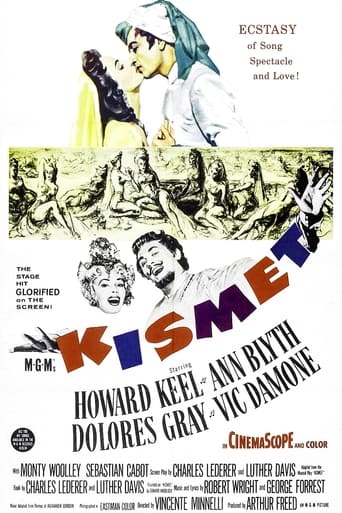dglink
A successful Broadway musical that opened in 1953 and won the Tony Award for Best Musical, "Kismet" was brought to the screen by MGM under the guidance of producer Arthur Freed and director Vincente Minnelli. Despite those gilded credentials, the film is a mixed bag that flies high when Howard Keel sings, and plummets when Vic Damone is on screen. Keel has a strong baritone voice that, coupled with a physique and screen presence to match, enhanced such great musicals as "Show Boat," "Kiss Me Kate," and "Seven Brides for Seven Brothers." If a younger Keel had been cast as the Caliph in this film, his rendition of "Stranger in Paradise" alone would have rocked the theaters. However, cast as Hajj, Keel has lesser songs, and, while he gets a girl, he does not get the girl. Although Vic Damone had a successful recording career, his on-screen presence is pallid, and his voice, while good, fails to match Keel's by any measure. As the Caliph, Damone is a wimpy colorless ruler.Beyond the two male leads, Anne Blyth appears as Marsinah, Hajj's daughter, and Dolores Gray plays Lalume, the Wazir's wife. Both are adequate, but Gray displays her extensive musical experience, although her broad performance is better suited to stage than screen. Set in a never-never land called Baghdad, which should not be confused with the capital of Iraq, the slight predictable storyline involves a young caliph seeking a wife, a strolling inventor of rhymes, the rhymer's lovely daughter, a power-hungry wazir, and the wazir's neglected wife. While admittedly derived from a stage production, the on-screen silliness plays against obviously fake backdrops derived from some production designer's fantasies. Perhaps the art director over-indulged in curry, kebabs, and hummus, then fell asleep reading "The Arabian Nights." The sets are garish and flimsy, and the costumes are equally gaudy. However, cinematographer Joseph Ruttenberg captures all the vibrant color, which is undeniably eye catching, and Andre Previn adapted the fine Broadway score, based on melodies by Alexandr Borodin.Unfortunately, the skilled hands of Freed, Minnelli, Ruttenberg, Previn, and Keel could not lift "Kismet" above a second-tier MGM musical. Despite some memorable songs, energetic choreography by Jack Cole, and a bold brash performance by Howard Keel, the film can be tough going at times. What should have soared, instead lumbers. Movie musicals petered out in the years after "Kismet," and, while this adaptation did not hammer in the last nails, it did not help either. However, for MGM musical completists and fans of Howard Keel, "Kismet" is essential viewing; for others, passable entertainment at best.
TheLittleSongbird
While not up there with the classic film musicals, Kismet is one of the underrated ones. The complaints that some have for the film are understandable, the script apart from some deliciously witty moments(mainly from Keel and Gray) is somewhat weak and is swamped by everything else, Vincente Minelli's direction at times is cold and hasty- which comes through loud and clear in Gesticulate, very indifferently directed and the weakest song in the film too- and while youthful and suave Vic Damone is rather bland as an actor. There is much to recommend though. The production values are the very meaning of lavish and look gorgeous, the locations and photography are very exotic and who cannot love Delores Gray's outfits. The choreography is spirited and seductive as well as clever and generally tasteful(Not Since Ninevah stands out), and the story is charming enough, a little silly but hardly a bore. There are no complaints to be had with the songs and score, the score is lush and the songs, based on the music of Borodin with clever lyrics, apart from Gesticulate are wonderful. Stranger in Paradise, And This is My Beloved, The Olive Tree and Baubles, Bangles and Beads are the highlights, though Night of My Nights is also lovely. It is a shame about the absence of Was I Wazir? though, though you can sort of understand why it was omitted. The cast are good, Dolores Gray steals the show as a deliciously sultry Lalume, Rahadlakum is a show-stopper. Howard Keel clearly is having the time of his life in his role as Hajj, if at times playing it a little too on the broad side, his beautiful rich voice still sounds great and is one of those voices that is difficult to be tired of. Ann Blyth is too old but is still utterly beguiling and sings beautifully, especially in Baubles, Bangles and Beads and And This is My Beloved. Sebastian Cabot is wonderfully wicked with a touch of buffoonery, though I've always preferred his more distinguished style of acting. All in all, not perfect by any stretch of the imagination but well worth seeing, especially for the production values, the songs, Keel and Gray. 7/10 Bethany Cox
ChorusGirl
One of the last big MGM musicals, and who expected they would return to the 1929 early talkie format?...nail the camera to a seat in the 10th row, have people stand around and talk--and then move over here and talk some more, don't edit out anything no matter superfluous or expendable it is, let everyone give hammy Vaudeville performances, and stage completely static musical numbers (there's even a pageant...like out of an old Ziegfeld show). It's as though there had been NO advances in film-making in the previous 20 years.On the upside...the score is excellent, and if you rent the 2008 DVD (contained in "Musicals from The Dream Factory Vol 3"), you will get a sense of what real, movie palace stereo used to sound like. Also, like most early Cinemascope movies, it is super duper wide, which is always thrilling to look at on a widescreen TV (even if the subject matter is as anemic as this). Note the gaudy costumes...designed by none other than Tony Duquette, the famed interior designer.
theowinthrop
KISMET was originally a play by Edward Knobloch written about 1910, and used as a vehicle for many years by the popular Broadway character actor Otis Skinner, playing the role of Hajj, the philosophical thief who saves the Caliph of Baghdad. Skinner even did a silent film version of the play. Two years after his death in 1942 a sound version of the film (in color) was made starring Ronald Colman, Marlene Dietrich, and Edward Arnold. The movie was a success, but nobody realized it would shortly become extremely successful in a new way. A song writing team (Bob Wright and Chet Forrest) constructed a score for KISMET based on the melodies of Alexander Borodin. The score contained such songs that became standards as STRANGER IN PARADISE (from the "Polevetsian Dances" in the opera PRINCE IGOR), BAUBLES, BANGLES, and BEADS, THIS IS MY BELOVED, THIS WAS THE NIGHT OF MY LIFE, and others. Wright and Forrest would do this several times on Broadway (they composed reset themes by Heitor Villa Lobos in another musical, for example) but KISMET was their joint masterpiece. So successful were they at rejuvenating the old Knobloch play, it was eventually revived again in the late 1990s in a new form as TIMBUCTOO (reset from the Califate of Baghdad to the great African trade city).Eventually the musical came to the attention to the Freed unit at MGM, and Vincent Minelli was chosen to direct this 1955 version. The musical expanded on the play a little. Howard Keel (as Hajj - the name was restored to the original one, not Hafiz as Ronald Colman was named in the 1944 version) is involved at the beginning with Jay C. Flippen as a violent bandit leader who is seeking his son, and whom Hajj suggests will be found in Baghdad. We see Flippen from time to time looking for his missing son. In the end he does find the son (who lives up or down to Flippen's own reputation). Keel had the right voice for Hajj, as did Dolores Gray as Lalume, the Vizier's bored wife (Dietrich in the 1944 film). Ann Blyth played Hajj's daughter Marsinah (who falls for the Caliph, Vic Damone). The evil vizier was played by Sebastian Cabot, and his rival government figure Omar (played by Harry Davenport in the 1944 film) is now played by Monty Wooley, in his final major movie part. Actually the musical is livelier than it's critical history suggests. The old creaky play may turn off many critics, but it had some color, and the Borodin-inspired melodies raised it. But like BRIGADOON, Minelli could not shoot the film on location as it would have been incredibly expensive. Possibly the studio sets may have effected how the film was received by the critics. But it is entertaining, and (because of the music) very memorable. If some numbers were cut most of the big numbers were saved. Besides, I'd rather hear Keel sing A FOOL SAT BENEATH AN OLIVE TREE than hear Cabot (a questionable singing talent) try WAS I VIZIR. I don't think Sebastian Cabot even tried to sing once on FAMILY AFFAIR...his was a distinguished speaking voice, not a singing one.




